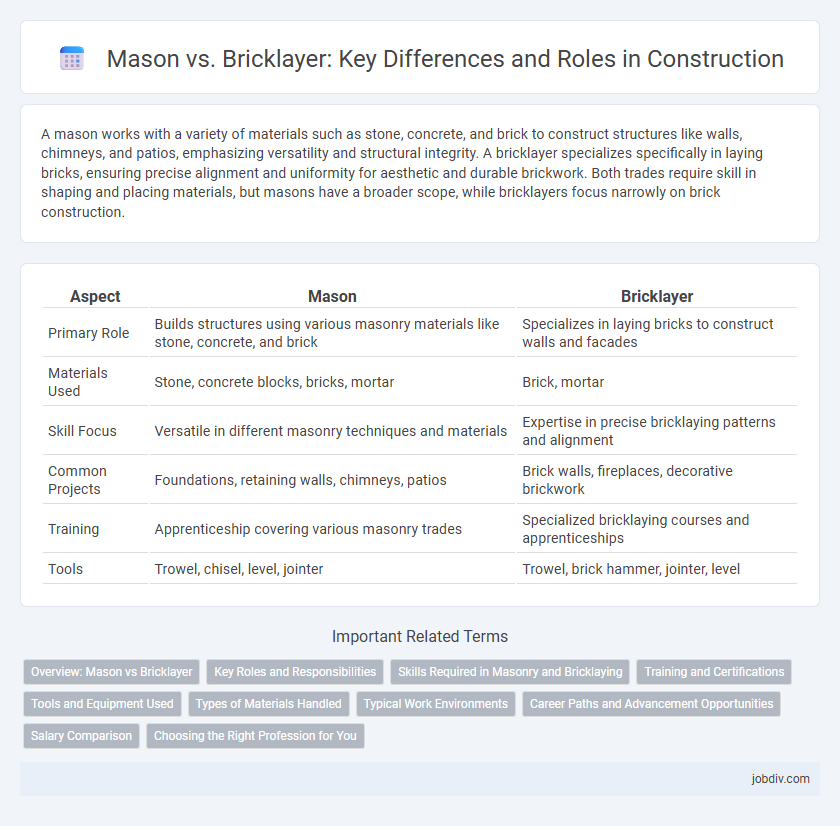A mason works with a variety of materials such as stone, concrete, and brick to construct structures like walls, chimneys, and patios, emphasizing versatility and structural integrity. A bricklayer specializes specifically in laying bricks, ensuring precise alignment and uniformity for aesthetic and durable brickwork. Both trades require skill in shaping and placing materials, but masons have a broader scope, while bricklayers focus narrowly on brick construction.
Table of Comparison
| Aspect | Mason | Bricklayer |
|---|---|---|
| Primary Role | Builds structures using various masonry materials like stone, concrete, and brick | Specializes in laying bricks to construct walls and facades |
| Materials Used | Stone, concrete blocks, bricks, mortar | Brick, mortar |
| Skill Focus | Versatile in different masonry techniques and materials | Expertise in precise bricklaying patterns and alignment |
| Common Projects | Foundations, retaining walls, chimneys, patios | Brick walls, fireplaces, decorative brickwork |
| Training | Apprenticeship covering various masonry trades | Specialized bricklaying courses and apprenticeships |
| Tools | Trowel, chisel, level, jointer | Trowel, brick hammer, jointer, level |
Overview: Mason vs Bricklayer
Masons and bricklayers both play essential roles in the construction industry, specializing in working with different types of materials; masons handle a variety of materials such as stone, concrete blocks, and bricks, while bricklayers focus primarily on laying bricks. Both trades require precision in measuring, cutting, and joining materials with mortar to construct walls, buildings, and other structures. Understanding the distinction helps in project planning and allocation of skilled labor for building durable and aesthetically pleasing structures.
Key Roles and Responsibilities
Masons specialize in working with a variety of materials including concrete, stone, and bricks, focusing on constructing and repairing structures like walls, floors, and chimneys. Bricklayers primarily handle the precise laying of bricks and blocks to build walls, partitions, and other architectural elements, ensuring structural integrity and aesthetic alignment. Key responsibilities of masons include mixing mortar and applying it to bind materials, while bricklayers concentrate on jointing and finishing brickwork to meet design specifications.
Skills Required in Masonry and Bricklaying
Masonry requires skills in cutting, shaping, and installing various materials like stone, concrete, and brick, emphasizing precision and structural integrity. Bricklaying focuses on expert handling of bricks, mortar mixing, and creating uniform, aesthetically pleasing patterns. Both trades demand physical strength, attention to detail, and knowledge of construction safety standards.
Training and Certifications
Masons typically undergo extensive training that includes apprenticeships covering a range of materials such as stone, concrete, and brick, with certifications like the Certified Mason (CM) credential enhancing their professional credibility. Bricklayers focus more specifically on laying bricks and blocks, often completing specialized apprenticeships and earning certifications like the Bricklayer Certification from trade organizations to validate their skill set. Both trades require rigorous hands-on experience and safety training to ensure compliance with industry standards and effective project execution.
Tools and Equipment Used
Masons primarily use tools such as trowels, levels, plumb bobs, and masonry hammers to shape and set concrete, mortar, or stone. Bricklayers specialize with tools like brick trowels, line pins, joint rakers, and brick hammers designed specifically for precise brick placement and joint finishing. Both trades rely on protective gear like gloves, goggles, and dust masks to ensure safety during bricklaying and masonry construction tasks.
Types of Materials Handled
Masons primarily handle a variety of materials such as concrete, stone, and cement blocks, employing these to construct foundational and structural elements like walls and pillars. Bricklayers specialize in working with clay bricks and sometimes concrete bricks, using mortar to bind them into durable, often decorative, surfaces. Both trades require expertise in material properties to ensure stability, weather resistance, and aesthetic quality in construction projects.
Typical Work Environments
Masons typically work on larger construction projects such as commercial buildings, bridges, and infrastructure, often operating outdoors in varying weather conditions and on scaffolding or elevated platforms. Bricklayers primarily focus on residential or smaller-scale commercial buildings, laying bricks in structured, controlled environments that may include both interior and exterior settings. Both professions require physical stamina and precision, but masons generally encounter more diverse work environments compared to the more uniform settings for bricklayers.
Career Paths and Advancement Opportunities
Masons typically specialize in concrete, stone, and block construction, providing opportunities to advance into supervisory or project management roles on large-scale infrastructure projects. Bricklayers concentrate on laying bricks and blocks for walls and facades, often moving toward specialized restoration work or craftsmanship in historical building preservation. Career advancement in both fields depends on gaining certifications, mastering advanced techniques, and developing skills in blueprint reading and site leadership.
Salary Comparison
Masons earn an average salary ranging from $40,000 to $70,000 annually, depending on experience and location, while bricklayers typically report salaries between $35,000 and $65,000 per year. The demand for skilled masons in commercial construction projects often results in higher wage potential compared to residential bricklaying roles. Salary differences are also influenced by certifications, union membership, and regional construction market conditions.
Choosing the Right Profession for You
Masons specialize in working with a variety of materials including concrete, stone, and bricks, making them versatile in structural and decorative construction tasks. Bricklayers focus specifically on laying bricks to build walls, partitions, and other brick-based structures, emphasizing precision and aesthetic alignment. Choosing between mason and bricklayer depends on your interest in either diverse masonry techniques or specialized brickwork craftsmanship within the construction industry.
Mason vs Bricklayer Infographic

 jobdiv.com
jobdiv.com